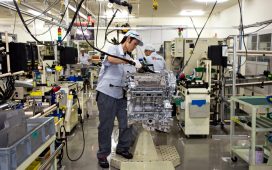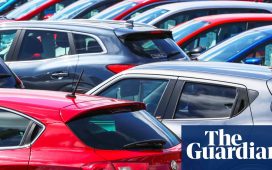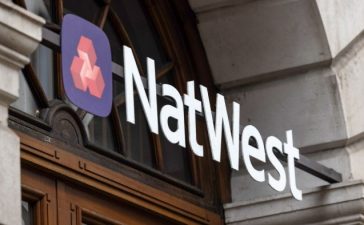Sir Jim Ratcliffe, the billionaire chemicals magnate behind Manchester United, is a man who likes a beer. He considers this important enough to include in the eccentric mission statement pictogram he devised to “capture how Ineos works, and why”.
The Ineos Compass, which he devised in 2022, includes a dizzying array of words and phrases, divided between those that Ratcliffe likes (“a beer”, “out of the box thinking”, “doggedness”) and those that he doesn’t (“politics”, “losing money”, “people who get on the bus”). If there are clues to Ratcliffe’s vertiginous rise and recent troubles they might be here.
Ratcliffe became one of Britain’s wealthiest men after building a chemicals empire from the £84m purchase of a single Belgian oil refinery in 1998. In the years that followed the engineering graduate turned private equity executive continued to snap up the cut-price assets that big fossil fuel companies no longer wanted.
Today the Ineos chemicals conglomerate is expansive and opaque. It is made up of about 30 distinct companies, each with their own chief executive, which together operate more than 170 sites across 32 countries. This federal structure appears to be woven together through a system of loans and dividends that allow the cash-rich behemoths of Ratcliffe’s empire to support its weaker areas. Ultimately, dividends flow upwards to a holding company controlled by Ratcliffe alongside rich-list regulars Andy Currie and John Reece, who each own a 20% stake.
For years the system worked. Ratcliffe’s early gamble on the chemicals industry at the turn of the millennium coincided with a decades long profit boom in the industry. For the last 20 years producing chemicals has generated returns well above those of the broader capital markets, according to research from the consulting group McKinsey.
The billions made from producing the chemical building blocks essential for modern life have been used to expand the company’s reach to include more familiar emblems of masculinity. There is Ratcliffe’s string of sporting teams as well as the fashion brand Belstaff, known for its leather jackets, and the Ineos Grenadier 4×4 off-roader. Depending on who you ask these are either passion projects or vanity ventures. By either definition, many are now in financial peril at a time when the easy earnings of the chemical industry have become more difficult.
The industry reached a peak shortly before the outbreak of the Covid-19 pandemic, which shut down global economies and triggered a collapse in refinery earnings. There was another steep dive after the global energy crisis triggered by Russia’s invasion of Ukraine three years ago, which caused costs to rocket to record highs and remain inflated today.
The change in fortunes has decimated earnings at the largest Ineos companies. The most recent accounts from Ineos Group, its Luxembourg-based business, show that its profit before tax plunged by €1.87bn in 2023 to €407.8m, compared with €2.28bn for the same period in 2022. Its largest UK company, Ineos Industries, slumped to a loss of just over €1bn in 2023 from a profit of €1.5bn the year before. One of the company’s subsidiaries, Ineos Quattro, reported a loss of €203.1m in 2023, from a profit of €1.96bn, and admitted it was “significantly indebted”. It owed €7.33bn, more than double its total equity of €3.25bn.
The credit ratings agencies Fitch and Moody’s have raised red flags over the outlook for the group’s financial health, too. At Ineos Group alone the debt pile is expected to climb to almost €12bn (£10bn) this year, according to Fitch, or more than five times its earnings. The agency said there was “uncertainty” over the plan to repay related-party loans of £800m to other parts of the Ineos business empire. The company’s unrestricted cash of €2.3bn should easily cover the €500m of debt due within the next 12 months, Fitch added.
Still, the warnings are a stark reminder of the 2008 financial crisis, when the company was forced to beg its banks to waive the repayment terms on the $9bn it borrowed to buy BP’s refining business to avoid bankruptcy. Ineos has described the period as the “darkest moment in the company’s history”.
Ratcliffe blamed high energy costs, “the deindustrialisation of Europe” and “extreme carbon taxes” earlier this week for the company’s struggle to make its sponsorship payments to the All Blacks rugby team, in a defence that will be familiar to the industry.
Steve Elliott, the chief executive of the Chemicals Industry Association, said: “We are experiencing the most challenging of times in terms of uncompetitive input costs, suppressed demand and, it has to be said, a manufacturing-unfriendly policy and regulatory environment. All with no immediate end in sight.”
“Every chemical business across the UK is paying more for its energy than competitors elsewhere – as much as 400% higher than in America – with the added challenge of a hugely ambitious net zero transition timeline and hostile policy agenda,” Elliott added.
The struggles of the petroleum business have been most evident in Scotland, where Ineos is planning to close the refining arm of Grangemouth, a joint venture with the state-owned PetroChina, with the imminent loss of more than 400 jobs. About 80 people will be left to handle petrol imports.
The Scottish government is still thought to be negotiating with the company to avoid the job losses, although its prospects for success appear limited without big subsidies. Questions have been raised in parliament over why the government has guaranteed a €700m (£582m) loan to help Ineos build a whole new refinery in Antwerp, while not offering enough to support jobs in Scotland. The Unite union has proposed a plan to convert the refinery operations to produce sustainable aviation fuel (SAF) for jets.
after newsletter promotion
“Any future transition of jobs away from fossil fuels is going to need support from government,” said Derek Thomson, the Unite Scotland regional secretary. “We cannot allow the industrial heartlands of the country to be ripped out.”
Yet workers at Grangemouth were also irked last month when the UK chancellor, Rachel Reeves, appeared to overlook the site when touting SAF’s promise in a major speech. It was not Grangemouth, but rather Teesside that she said would get the jobs. In the same speech, Reeves said the government was backing plans for the redevelopment of the Old Trafford stadium.
The redevelopment is an important part of Ratcliffe’s plans for Manchester United, after he took control at the end of 2023. He has set about cutting costs dramatically in what he has described internally as necessary moves to prevent the club from going bust and return it to its former trophy-winning strength.
One of the biggest drains on Ineos’s coffers is its car business. Ratcliffe set up Ineos Automotive to create a new off-road vehicle after Land Rover’s owner JLR turned its rugged Defender into a premium SUV.
Yet even billionaires have struggled to build new car companies. James Dyson, a fellow super-rich manufacturer (and another Brexit backer) said he blew £500m on building an electric car that never took to roads. Ratcliffe appears to have outdone him: Ineos Automotive has burned through €1.4bn since 2018, and it had another €2.3bn in debt at the end of 2023.
That was before the collapse of a seat supplier in September forced it to pause production for three months. A person with knowledge of its operations said the company was ramping up production at its factory in France (which was chosen ahead of a plant in south Wales) although it had been affected by the slow demand felt across the car industry.
Sport and cars are not Ineos’s only side hustles: in 2022 Ineos bought Ratcliffe’s favourite pub, the Grenadier in London’s exclusive Belgravia, before using its name for Ineos’s car. The early 18th-century pub is famous (possibly erroneously) for generations of punters sticking money to the ceiling to pay off the debts of a soldier killed for cheating at gambling.
Ghost-hunting revellers are perhaps more likely to spot Ratcliffe, who came up with the idea of building the car there. The pub reported a loss of £1.4m in 2023, despite Ineos Automotive spending €400,000 there, according to company accounts.
Ineos did not respond to a request for comment.











